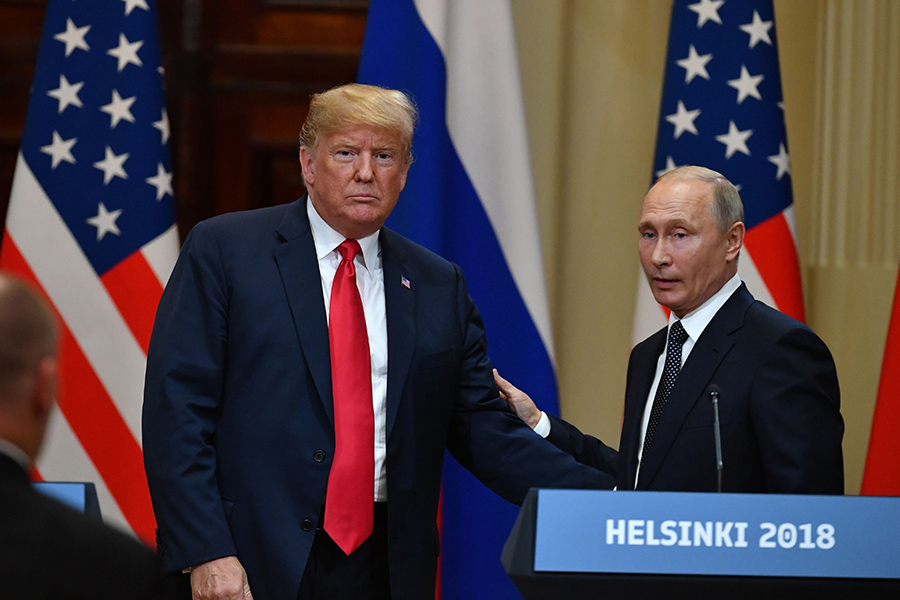"I find hope in the work of long-established groups such as the Arms Control Association...[and] I find hope in younger anti-nuclear activists and the movement around the world to formally ban the bomb."
INF Termination Is Bad, but It Could Get Worse
November 2018
By Daryl G. Kimball, Executive Director
Earlier this year, President Donald Trump told reporters that he wanted to work with Russian President Vladimir Putin “to discuss the arms race, which is getting out of control.” He characterized the costly nuclear weapons upgrade programs being pursued by each side as “a very, very bad policy.”
 But now, under the influence of his national security adviser, John Bolton, Trump has announced he will “terminate” a key nuclear arms control agreement that helped end the Cold War arms race—the Intermediate-Range Nuclear Forces (INF) Treaty. The decision is an unnecessary and self-defeating wrong turn that could lead to an unconstrained and dangerous nuclear arms competition with Russia.
But now, under the influence of his national security adviser, John Bolton, Trump has announced he will “terminate” a key nuclear arms control agreement that helped end the Cold War arms race—the Intermediate-Range Nuclear Forces (INF) Treaty. The decision is an unnecessary and self-defeating wrong turn that could lead to an unconstrained and dangerous nuclear arms competition with Russia.
The Reagan-era INF Treaty banned an entire class of destabilizing U.S. and Russian nuclear weapons that were deployed in Europe. The treaty led to the verified destruction of 2,692 nuclear-armed U.S. and Russian missiles.
The treaty has been at risk since 2014, when Washington publicly charged that Moscow twice had tested a ground-launched missile having a range beyond the 500-kilometer limit set by the treaty. In 2017 the Pentagon said Russia had deployed a small number of these missiles, which the State Department identified in January 2018 as the 9M729.
Diplomatic efforts to resolve the compliance issue have been limited and unsuccessful. Russian officials deny the U.S. charges and point to their own concerns that the U.S. missile interceptor launchers deployed in Romania might be used to deliver offensive missiles.
Since Trump took office, U.S. and Russian officials have met only twice to try to resolve the dispute. Neither side appears to have seriously pursued the option of reciprocal transparency measures or the option of modifying or removing the Russian missiles of concern to bring Russia back into compliance.
Trump claims that the United States is pulling out to show Russia that he will not tolerate its alleged violation of the treaty, but U.S. withdrawal does nothing to bring Russia back into compliance, and it distracts from Russian actions that precipitated the INF Treaty crisis.
Worse yet, U.S. withdrawal opens the door for Russia to produce and deploy the missile of concern in greater numbers without any constraints. This threatens to renew Cold War-style tensions over deployment of intermediate-range missiles in Europe and elsewhere. The last time that happened, in 1983, millions of Europeans marched in the streets in protest.
Even without the INF Treaty in force, Congress and NATO should reject Trump’s call for a new U.S. ground-launched, INF-range missile in Europe or elsewhere and instead focus on maintaining U.S. and European conventional military preparedness. The United States can already deploy air- and sea-launched systems that can threaten Russian targets and hold at risk targets in China.
Trump’s INF Treaty decision is a debacle, but things could get even worse. If the treaty collapses, as appears likely, the only remaining agreement regulating the world’s two largest nuclear stockpiles will be the New Strategic Arms Reduction Treaty (New START). That 2010 treaty, which limits the two sides’ long-range missiles and bombers and caps the warheads they carry to no more than 1,550 each, is due to expire in 2021 unless Trump and Putin agree to extend it by a period of up to five years, as allowed for in the accord’s Article XIV.
Key Republican and Democratic senators and U.S. NATO allies are on record in support of the treaty’s extension, which can be accomplished without further Senate or Duma approval.
Unfortunately, Bolton may try to sabotage that treaty too. Since he arrived at the White House in April, he has been slow-rolling an interagency review on whether to extend New START and refusing to take up Putin’s offer to begin extension talks.
Extension talks should begin now, in order to resolve outstanding implementation concerns that could hold up the treaty’s extension. Instead, Bolton is talking about an approach that would dispense with New START and its rigorous inspection system for warheads and missiles to ensure compliance.
Bolton’s alternative would simply set limits on deployed warheads only and without any verification, an approach Moscow is very unlikely to accept because it could give the United States a significant breakout advantage.
Without New START, there would be no legally binding limits on the world’s two largest nuclear arsenals for the first time since 1972. Both countries would be in violation of their Article VI nuclear Nonproliferation Treaty obligation to “pursue negotiations in good faith on effective measures relating to cessation of the nuclear arms race at an early date and to nuclear disarmament....”
It is now all the more important to get a serious U.S.-Russian arms control dialogue back on track. If not, an even more dangerous phase in U.S.-Russian relations is just over the horizon.
